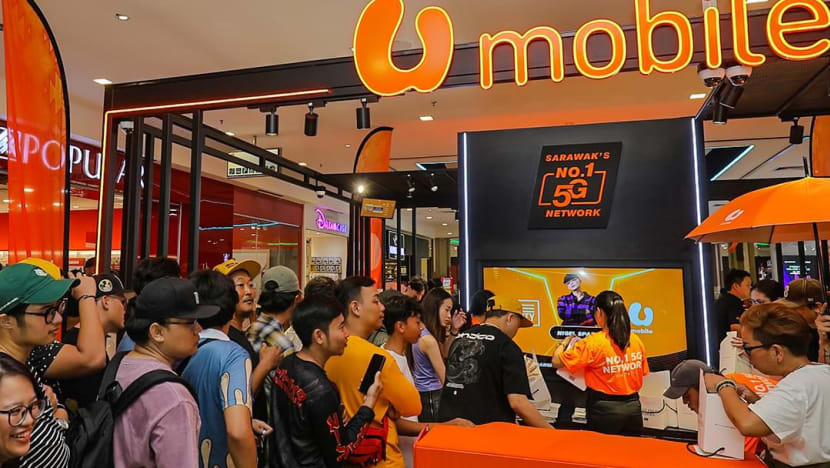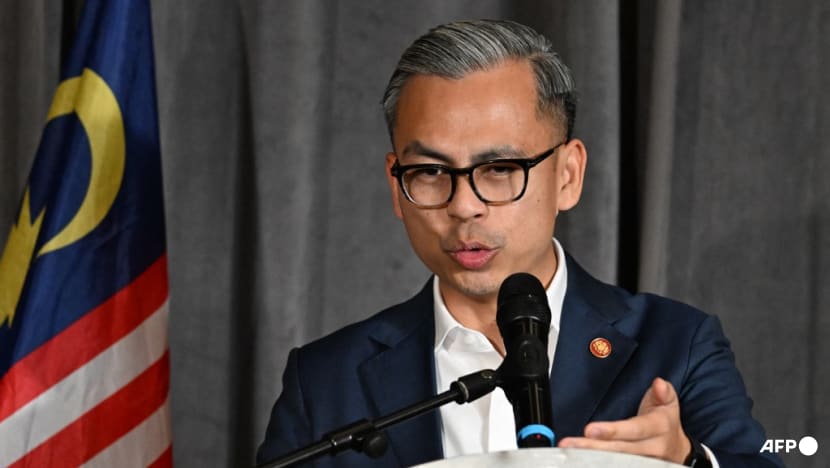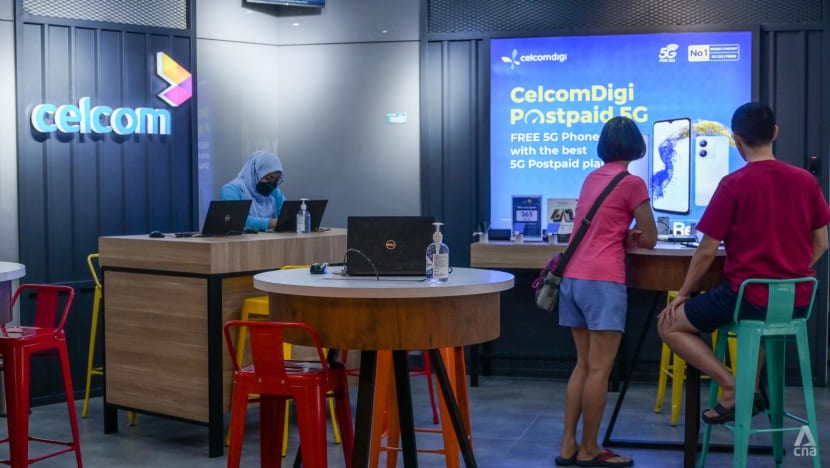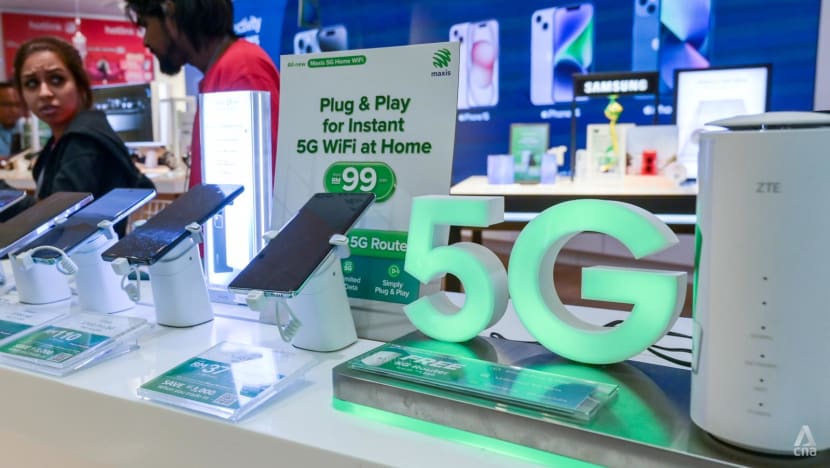Singapore-linked 5G operator chosen independently, does not breach good governance: Malaysia Communications Minister
U Mobile beat bids from some of the country’s largest network operators to be selected as Malaysia’s second 5G network, prompting surprise from the market.

U Mobile Sdn Bhd is one of the country's smallest operators. (Photo: Facebook/U Mobile)

This audio is generated by an AI tool.
KUALA LUMPUR: Top officials were not involved in decisions over the country’s second 5G telecommunication network operator, said Malaysia’s Communications Minister Fahmi Fadzil, after the choice raised eyebrows among market players.
U Mobile Sdn Bhd is one of the country's smallest operators and overtook bids by two of Malaysia’s largest mobile network operators, Maxis Bhd and CelcomDigi Bhd, according to the New Straits Times.
“The (Malaysian Communications and Multimedia Commission) MCMC, as an independent body, has conducted an appropriate evaluation through the implemented tender process," said Mr Fahmi, as quoted in the Malay Mail.
“Regarding the issue of shareholdings ... the Malaysian Communications and Multimedia Commission (picked) independently, the minister, deputy minister was not involved in any evaluation process,” Mr Fahmi said in parliament on Thursday (Nov 7).
He was responding to Member of Parliament for Pasir Gudang Hassan Karim’s question on Thursday on whether U Mobile’s selection as the second network provider was influenced by “any particular individuals within the company”, without naming anyone specifically.
MCMC is the regulator for the converging communications and multimedia industry in Malaysia.
Mr Hassan also asked why U Mobile, which is 48.28 per cent owned by Singapore-based Straits Mobile Investments Pte Ltd, was selected as the second 5G network provider.
Straits Mobile Investments, U Mobile’s majority shareholder, is also linked to Singapore state investment company Temasek Holdings.
Mr Fahmi said that the selection of the mobile network operator does not breach any stipulated conditions.
“From the perspective of both foreign and local shareholding, this decision (to select U Mobile) does not violate any of the conditions in place,” the communications minister responded.

Mr Fahmi, quoted by The Edge, added that the selection process was fully managed by the MCMC, and clarified that it was conducted through a "beauty contest" process, not a direct award.
In Malaysia, the maximum foreign shareholding permitted for a network service provider is 49 per cent, he said.
Meanwhile, U Mobile is already committed to reducing foreign holdings to 20 per cent, which Mr Fahmi raised in parliament.
“U Mobile will reduce its foreign majority shareholding to 20 per cent from the current 48.3 per cent to ensure greater Malaysian control,” the mobile network operator said in a media statement on Nov 2.
Currently, state-owned 5G operator, Digital Nasional Bhd (DNB), is the country’s primary 5G provider.
Mr Fahmi also stressed that U Mobile’s representation on the board of DNB did not contradict good governance.
“It was a decision by the previous administration to allow mobile network operators to subscribe to shares in DNB, granting them board representation," said Mr Fahmi, as quoted in The Edge.
It reported that currently, U Mobile and three other companies — CelcomDigi, Maxis, and YTL Power International Bhd each hold a 16.3 per cent stake in DNB, with the Ministry of Finance holding 34.88 per cent.
On Nov 6, MCMC also clarified in a media statement that the selection of U Mobile was based on various factors, including the business and technical proposals submitted, as well as its customer satisfaction levels and complaint rates.
Its performance in executing other infrastructure projects also played a part in the decision, the statement read, including “their notable contribution to the Universal Service Provision projects such as Jendela Phase and the 4G upgrading project” which was again reiterated by Mr Fahmi in parliament.
The Jendela plan was formulated to provide wider coverage and better quality of broadband experience.
Mr Fahmi however did not explain why U Mobile’s bid was selected over other competitors, notably Maxis and CelcomDigi.CelcomDigi has over 20 million subscribers while U Mobile only has around 8.5 million subscribers, according to the official sites of both operators.
Maxis has over 13 million customers, according to its 2023 annual report.

Maxis had announced that it would engage with MCMC to “understand the rationale” for MCMC’s decision in a media statement on Nov 3, highlighting that the company is principally owned by Malaysians and 77 per cent of its shares are also owned by Malaysians.
“Our deep roots in Malaysia ensure that we always have the best interest of the rakyat (people) and nation in mind,” it said.
Financial services provider CIMB Securities said the decision came as a surprise to the firm and the market.
"Maxis or CDB (CelcomDigi) … were widely expected to win, being the two largest MNOs (mobile network operators) in Malaysia" it said, as quoted in the New Straits Times.
TENSIONS IN MALAYSIA’S 5G ROLL-OUT NOT NEW
This is not the first time the telecommunications sector and the roll-out of the 5G network in Malaysia have been fraught with tension.
The 5G plan has been mired in the country’s politics following the historic loss of the Barisan Nasional coalition to the opposition Pakatan Harapan (PH) in the May 2018 general election.
The new PH government had originally planned to award the 5G spectrum through a bidding process which would require the country’s telcos to come together in separate consortiums to participate in the tender.
But that plan was shelved after PH lost power in late February 2020 due to defections from its own camp in a political coup staged by former premier Muhyiddin Yassin, who led breakaway factions to form a new government with parties from the BN coalition.
The new Muhyiddin administration dumped plans to give the country's telco players a direct role in the 5G rollout. And in March 2021, the government declared that ownership of the country’s 5G spectrum would be vested with the newly incorporated DNB which would offer wholesale access to all licensed telecom operators on an equal basis.
The proposal to create a so-called single wholesale network at the estimated cost of close to RM16 billion (US$3.6 billion) came under fire from the telco lobby and opposition politicians, who argued that the ambitious economic plan was never subjected to any public scrutiny and they articulated concerns of a monopoly.
The unity government led by Prime Minister Anwar Ibrahim then decided to allow a second network to be set up when it took over in 2022, and to sell 70 per cent of DNB to the private companies.
But in April this year, CNA reported that a complex government-sponsored settlement agreement reached in early December 2023 between DNB and the country’s five private mobile telecommunication companies hit a stalemate, presenting Mr Anwar’s government with one of its most complex economic policy challenges.














